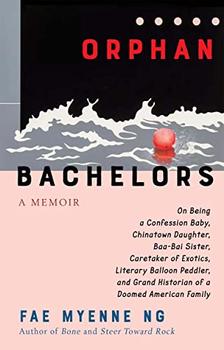Summary | Excerpt | Reviews | Beyond the Book | Readalikes | Genres & Themes | Author Bio

A Memoir
by Fae Myenne NgExcerpt
Orphan Bachelors
On this rare sunny day in the Outer Richmond of San Francisco, I take my late brother's tortoises down to the yard for their bath. My neighbor is in her garden and asks if I like gai choy.
"Love it,'' I say.
"Let me give you some."
I go to the fence and watch her cut the tall greens at their thick stems. When I reach for the bunch of bright stalks, I feel like a Miss Chinatown receiving her winning bouquet. The plumes of leaves are wider than bamboo and more delicate. I ask, "No slugs?"
"They don't like it," Fay says.
My name is Fae, too, but I don't know if we share the same Chinese character. Another day I'll ask if hers means smart or favored.
"Right. Too bitter," I say. Bitter is why I prefer gai choy over bok choy.
"Want more?" she offers.
Before I can decline, she's sending more over. The tall stalks double in my arms and I feel like a champ. Who wants to be Miss Chinatown anyway? my sister would say.
"Eat only once a week. Otherwise it's too yin," my neighbor advises.
Though my mother died in 2003, I still hear her at every meal, admonishing me for eating avocadoes, grapefruit, watermelons, any salad or raw food, all too cooling. Mom believed foods had hot and cold energies that harmonized the body, allowing it to govern health.
"Too much yin," she'd insist. "That's why you're always cold."
Growing up, this house wasn't heated. Tim, my youngest brother, put in a heating system when our mother got sick. Living here now, my Chinatown habits stick, and I can't seem to use it. This morning, when I checked the thermostat, it read 48 degrees, so I put on another sweater, proud not to waste money. When my guy, Ner, complains that all the surfaces are cold, I'm genuinely surprised. He lives off the grid in the Santa Cruz Mountains but says this house is colder than living in the woods.
Since Tim died in 2015, I've been taking care of his tortoises, his leopard geckos, and his garden. His Yoshino cherry trees have budded, and the dwarf nectarine trees are blooming. When Fay admires their tight vermillion blossoms, I turn around. Wow.
Three months into the lockdown, pandemic fatigue has made me chatty as a marooned sailor. When I ask about steaming the gai choy, my tongue feels thick. What's the word for "steam"? I can only think of the word for panfry— similar sounding—but which tone, rising or falling, lifting or flat?
Inside, I'm howling in Cantonese. My father also died in 2015. He was the last person I spoke my ancestral dialect with, and now that he's gone, there are no more laughing puns, no more witty rhymes, and no more recitation of the "Ballad of Mulan." Whatever time zone I was in, Manhattan, Rome, or outside the Mojave, my father and I spoke every night. Everyone else had had it with his pontificating so I was the relief talker.
At sea, his steady companion was silence; on land, his talk swelled like a storm. We called it boiling telephone jook, his stories like rice kernels churning in a pot. I knew them all by heart—being tricked by a story to come to America and then being swindled by more lies. Soon, every story was his vow to return to China. I listened with the phone pressed to my ear and filed papers or lay down—and more than once fell asleep.
When my father arrived in 1940, he lived at the Waverly Place, an S.R.O., one of many single-room occupancy hotels in Chinatown. That's where he met many of the old bachelors. Some had been hatchet men in their day and many still held a knife in one hand, a hammer in the other. Trust was a cautious currency. Any man could be an enemy. Any brother could betray you.
My father called them Orphan Bachelors, perhaps after the name Orphan Island, those foreign concessions in Shanghai that remained unoccupied by the Japanese, or the orphan warriors abandoned by the Qing, or closer to home, the conscripted village boys, maybe even after Fa Mulan, who volunteered to take her father's place in battle.
Excerpted from Orphan Bachelors © 2023 Fae Myenne Ng. Reprinted with permission of the publisher, Grove Press, an imprint of Grove Atlantic, Inc. All rights reserved.
Your guide toexceptional books
BookBrowse seeks out and recommends the best in contemporary fiction and nonfiction—books that not only engage and entertain but also deepen our understanding of ourselves and the world around us.